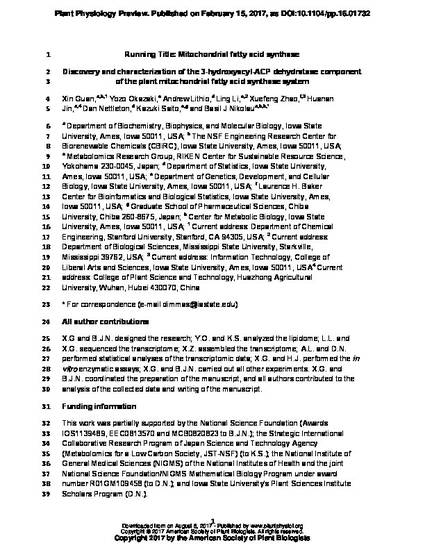
We report the characterization of the Arabidopsis 3-hydroxyacyl-acyl carrier protein (ACP) dehydratase (mtHD) component of the mitochondrial fatty acid synthase (mtFAS) system, encoded by AT5G60335. The mitochondrial localization and catalytic capability of mtHD were demonstrated with a green fluorescent protein (GFP) transgenesis experiment, and by in vivo complementation and in vitro enzymatic assays. RNAi knockdown lines with reduced mtHD expression exhibit traits typically associated with mtFAS mutants, namely a miniaturized morphological appearance, reduced lipoylation of lipoylated proteins, and altered metabolomes consistent with the reduced catalytic activity of lipoylated enzymes. These alterations are reversed when mthd-rnai mutant plants are grown in a 1% CO2 atmosphere, indicating the link between mtFAS and photorespiratory deficiency due to the reduced lipoylation of glycine decarboxylase. In vivo biochemical feeding experiments illustrate that sucrose and glycolate are the metabolic modulators that mediate the alterations in morphology and lipid accumulation. In addition, both mthd-rnai and mtkas mutants exhibit reduced accumulation of 3-hydroxytetradecanoic acid (i.e. a hallmark of lipid A-like molecules) and abnormal chloroplastic starch granules; these changes are not reversible by the 1% CO2 atmosphere, demonstrating two novel mtFAS functions that are independent of photorespiration. Finally, RNA-Seq analysis revealed that mthd-rnai and mtkas mutants are near equivalent to each other in altering transcriptome, and these analyses further identified genes whose expression is affected by a functional mtFAS system, but independent of photorespiratory deficiency. These data demonstrate the non-redundant nature of the mtFAS system, which contributes unique lipid components needed to support plant cell structure and metabolism.
Available at: http://works.bepress.com/basil-nikolau/42/

This is a manuscript of an article from Plant Physiology (2017), doi: 10.1104/pp.16.01732. Posted with permission.